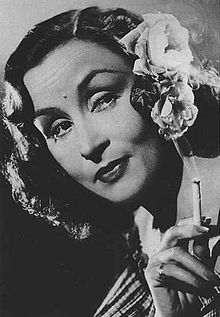Tita Merello | |
|---|---|
 | |
| Born | Laura Ana Merello 11 October 1904 Buenos Aires, Argentina |
| Died | 24 December 2002 (aged 98) San Telmo, Buenos Aires, Argentina |
| Resting place | La Chacarita Cemetery |
| Occupations |
|
| Years active | 1930–1985 |
Laura Ana "Tita" Merello (11 October 1904 – 24 December 2002) was an Argentine film actress, tango dancer and singer of the Golden Age of Argentine Cinema (1940–1960). In her six decades in Argentine entertainment, at the time of her death, she had filmed over thirty movies, premiered twenty plays, had nine television appearances, completed three radio series and had had countless appearances in print media. She was one of the singers who emerged in the 1920s along with Azucena Maizani, Libertad Lamarque, Ada Falcón, and Rosita Quiroga, who created the female voices of tango. She was primarily remembered for the songs "Se dice de mí" and "La milonga y yo".
She began her acting career in theater and may have made silent films. She debuted on the first sound movie produced in Argentina, ¡Tango!, with Libertad Lamarque in 1933. After making a series of films throughout the 1930s, she established herself as a dramatic actress in La fuga (1937), directed by Luis Saslavsky. In the mid-1940s, she moved to Mexico, where she filmed Cinco rostros de mujer (1947), which earned her an Ariel Award from the Mexican Academy of Film. She returned to Argentina and starred in Don Juan Tenorio (1949) and Filomena Marturano (1950), which were subsequently taken to the theater. Her period of greatest popularity came in the following decade, when she led films like Los isleros (1951), considered her best performance, Guacho (1954) and Mercado de abasto (1955). She also received praise for her work in Arrabalera (1950), Para vestir santos (1955) and El amor nunca muere (1955).[1]
From the 1960s, most of her work was directed by Enrique Carreras. During the period, she had a recurring role in the television series Sábados Circulares and continued making films, like Amorina (1961). Her role in 1974 as La Madre María, directed by Lucas Demare, was highly acclaimed as was her collaboration with Alejandro Doria in Los miedos (1980). She retired from theater in 1984 and films in 1985 but continued to act on TV and radio and was honored as "Citizen of the City of Buenos Aires" in 1990. Until her death at age 98, she continued to make appearances on television and radio.[2]
- ^ Tita Merello at IMDb
- ^ Tita Merello at IMDb